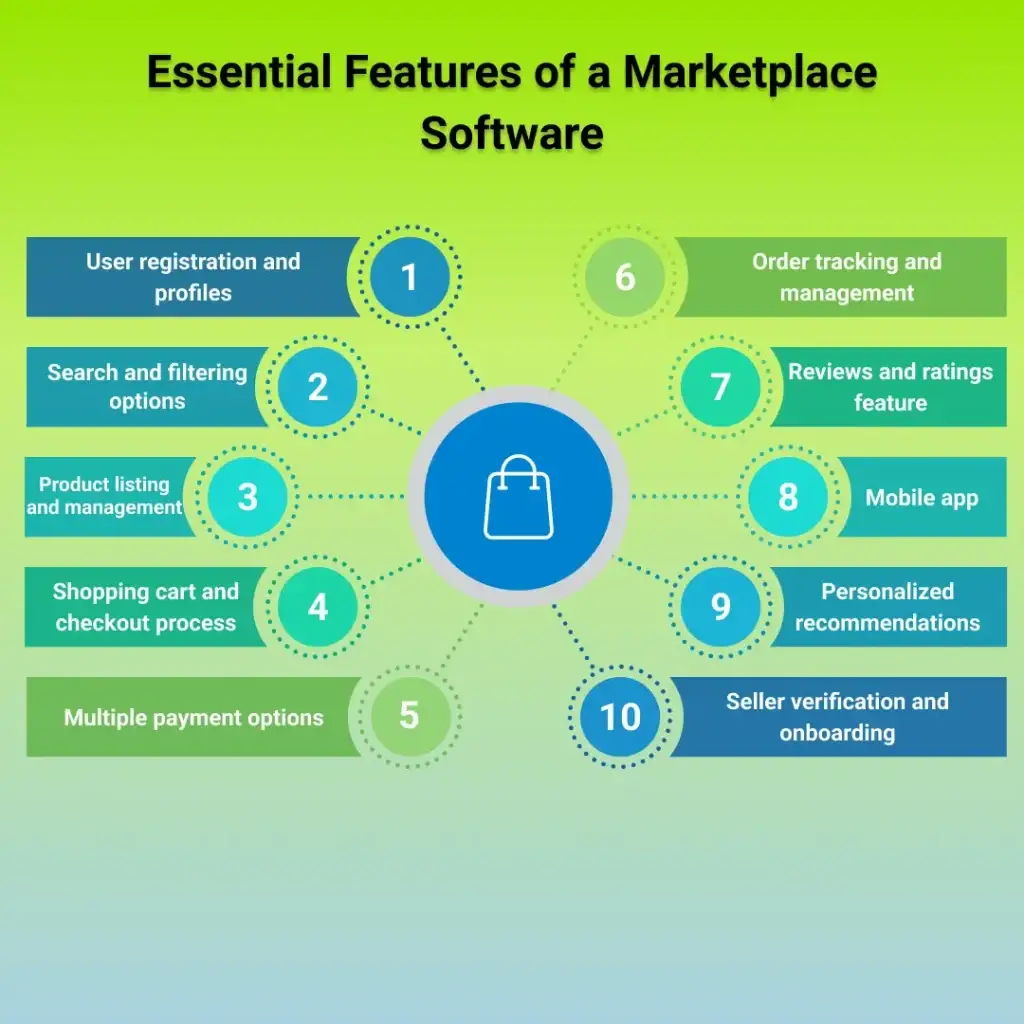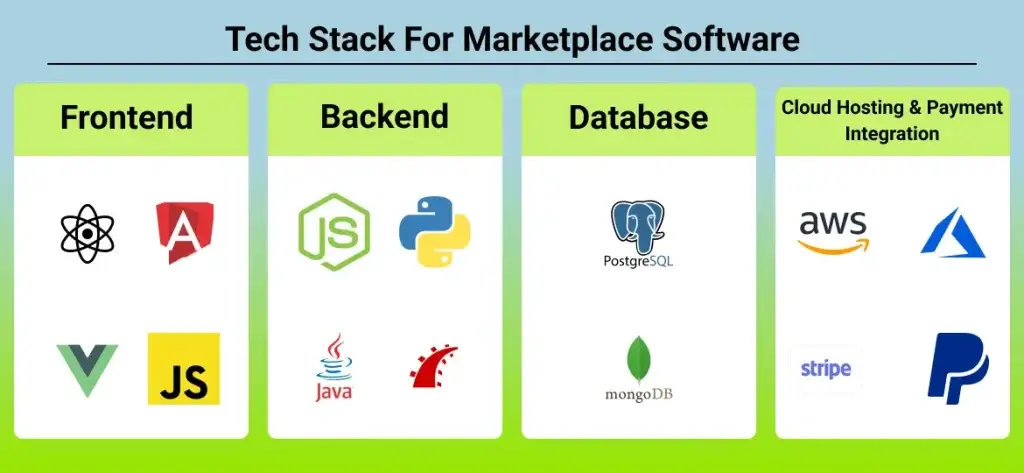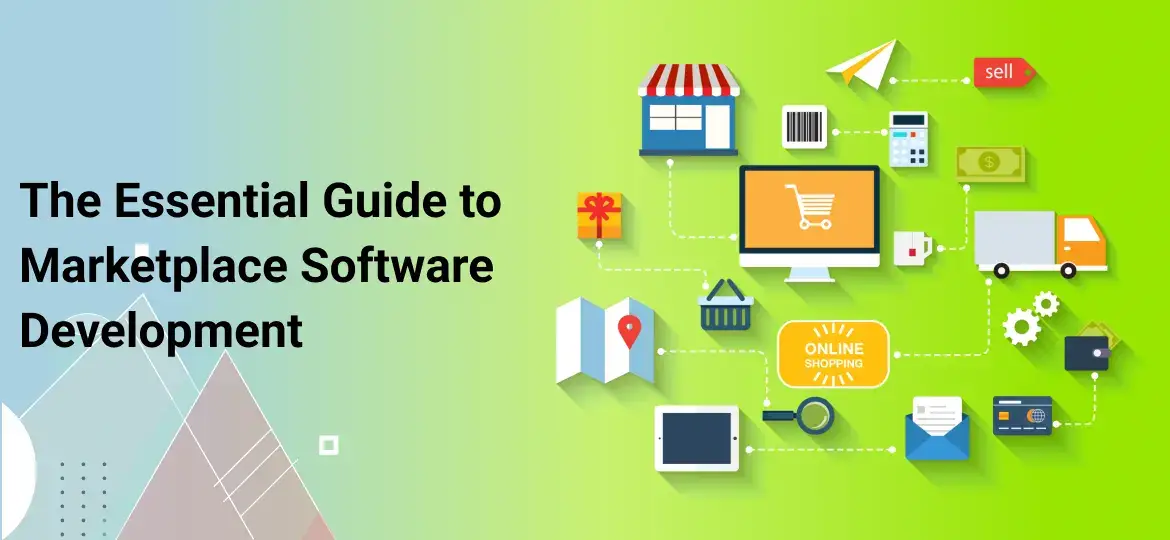Building a thriving online marketplace needs careful planning, reliable software, and a focus on user experience. Whether you want to be the next Amazon, Airbnb, or something altogether different, understanding the pricing, basic features, and technology underpinning marketplace software is critical. This thorough guide covers everything you need to know to get started, from assessing your marketplace development costs to deciding on the best tech stack for marketplace development.
Starting an e-commerce marketplace platform development project may be both thrilling and challenging. This is your online marketplace development guide, bringing you through the crucial phases required to create a booming marketplace. We’ll look at the features of marketplace software, including user administration and product catalogs, as well as payment gateways and shipping connectors.
For those looking for custom marketplace software solutions, we’ll go over the advantages of personalizing your platform to your exact requirements and target audience. Understanding the cost of building a marketplace website is critical for budgeting and planning, and we’ll discuss the aspects that determine development costs. With the appropriate technique and a thorough understanding of the essential components, you may transform your concept into a thriving online marketplace.
What is Marketplace Software?
Marketplace software serves as the backbone of online marketplaces, linking buyers and vendors. These platforms enable users to exchange goods, services, or information directly. Popular online marketplaces include Amazon, which is known for its diverse product offerings, and Airbnb, which promotes short-term property rentals.
The software handles essential functions such as user profiles, product listings, transactions, and communication. Its goal is to streamline these processes and create a safe, efficient environment in which buyers and sellers can engage.
Developing a marketplace from scratch is not a one-size-fits-all process. It necessitates specialized features that are specific to the industry and audience. But what makes it effective?
10 Must-Have Features to Add in Your Marketplace Software

The most effective marketplace platforms are user-friendly, safe, and efficient. Here are some of the essential features of marketplace platforms:
User registration and profiles
A smooth onboarding process is essential for both buyers and suppliers. New users should be able to register fast, whether via email or social network integration. Once enrolled, users want clear and easy-to-navigate profiles to maintain their preferences, track orders, and communicate with one another.
Search and filtering options
Nobody wants to waste time scrolling endlessly. Users can locate precisely what they wish to, thanks to advanced search and filtering features. Whether it’s price range sliders, category filters, or keyword searches, these features improve ease and satisfaction.
Product listing and management
Sellers require the ability to list products or services with minimal friction. Bulk uploads, inventory management, and the ability to insert full descriptions and photographs simplify the process. Buyers require clear product information in order to make informed decisions.
Shopping cart and checkout process
A streamlined shopping cart and checkout procedure may make or break the user experience. Buyers demand a natural flow with fewer steps and distractions. Saving goods, estimated totals, and promo code sections all help to provide a positive user experience.
Multiple payment options
Marketplaces cater to a varied population; therefore, offering a variety of payment ways is essential. Credit cards, digital wallets such as PayPal, and even cryptocurrency choices ensure that a diverse array of people can access them. Encrypted transactions and fraud protection measures are equally crucial.
Order tracking and management
Both buyers and sellers must be able to track the status of their orders. Real-time updates, shipment details, and expected delivery dates increase transparency and client satisfaction. A reliable order management system also makes it easier to handle refunds and returns.
Reviews and ratings feature
Reviews and ratings are crucial in establishing trust and credibility in a marketplace. Allowing users to rate and review products and vendors gives vital social proof, while also assisting other purchasers in making educated judgments. An adequately established review system promotes transparency and accountability.
Mobile app
In today’s mobile-first environment, a specialized mobile app is required. A mobile app enables consumers to browse, search, and buy things while on the road, making the experience more simple and accessible. Push notifications can also be utilized to keep users updated on new items, promotions, and order status.
Personalized recommendations
Personalized recommendations improve the user experience by proposing products or services that match their preferences. Marketplaces can deliver individualized suggestions based on user behavior and preferences, enhancing engagement and sales.
Seller verification and onboarding
A comprehensive verification and onboarding process is essential for marketplaces that accept third-party sellers. This ensures seller validity, protects customers from fraud, and fosters marketplace confidence. A simple and effective onboarding procedure encourages authentic sellers to join the site.
Cost of Marketplace Software Development
Various elements influence the marketplace website development cost. Here’s what you need to consider:
| Feature | Basic Marketplace | Mid-range Marketplace | Advanced Marketplace |
|---|---|---|---|
| Initial Development Cost | $30,000 - $75,000 | $75,000 - $150,000 | $150,000 - $250,000+ |
| Ongoing Maintenance & Updates | $2,000 - $5,000/year | $5,000 - $10,000/year | $10,000 - $20,000+/year |
Technology Stack for Marketplace Software Development

Frontend
- React
- Angular
- Vue.js
- JavaScript
Backend
- Node.js
- Python
- Java
- Ruby on Rails
Database
- PostgreSQL
- MongoDB
Cloud Hosting & Payment Integration
- AWS
- Microsoft Azure
- Stripe
- PayPal”
The technology stack you select will impact how your marketplace functions, as well as its scalability and long-term support. Here’s a summary of the technology stack for marketplace apps you’ll need:
Front End Technologies
Popular frontend frameworks for your platform’s user interface include:
- React is well-known for its speed and versatility, making it excellent for creating dynamic interfaces.
- Angular: An excellent option for larger, more sophisticated apps.
- Vue.js: A lightweight and beginner-friendly framework ideal for smaller teams or projects.
These technologies ensure that your interface remains responsive and visually appealing across all devices.
Backend Frameworks and Languages
The backend is the engine that powers your marketplace. Some popular options include:
- Node.js: is a fast and scalable framework that is extensively utilized in real-time applications.
- Python is popular for its simplicity and versatility, particularly with frameworks such as Django and Flask.
- Ruby on Rails: provides rapid development and well-maintained libraries.
Database Options
Your database will include information such as product listings, user profiles, and transaction histories. There are two primary alternatives.
- Relational databases (e.g., PostgreSQL, MySQL) are structured and excellent for applications that require apparent relationships between data.
- Non-relational databases (such as MongoDB) are better suited for handling unstructured or frequently changing data.
Cloud Hosting & Payment Integration
- Hosting and payment processing are the final elements of the puzzle. AWS and Microsoft Azure are popular hosting solutions, both of which provide scalability and robust security.
- Stripe and PayPal are reliable payment alternatives. They accept a variety of payment options, making them accessible to people all around the world.
Conclusion
Developing a marketplace platform necessitates careful planning. Every decision you make, from essential features like user profiles and safe payments to the tech stack you choose, has an impact on the success of your platform. The cost varies greatly depending on the features, complexity, and development team, but investing in a reliable marketplace is definitely worth it.
If you’re ready to bring your vision to reality, begin by establishing your objectives, researching your target audience, and collaborating with development specialists. With the appropriate strategy and technology, your marketplace may become the next big platform.
Echoinnovate IT specializes in providing high-quality marketplace platform development services. We understand the complexities of building a multi-vendor marketplace and can assist you in developing a robust and scalable platform that is tailored to your specific requirements. Our expertise includes creating a scalable marketplace software architecture that can accommodate growth and changing company requirements. We provide complete services, ranging from initial consulting and planning to development, testing, deployment, and continuing maintenance. Contact us today to discuss your market vision and how we can help you make it a reality.
FAQs: Marketplace Software Development: Cost, Features & Tech Stack
What is Marketplace Software Development?
Marketplace software development involves creating a digital platform where buyers and sellers can interact, trade, or exchange services. It includes eCommerce platforms, service-based marketplaces, and peer-to-peer (P2P) solutions like Amazon, Uber, or Airbnb.
How Much Does It Cost to Develop a Marketplace Platform?
The cost of developing a marketplace depends on various factors, including:
💰 Basic MVP Development: $20,000 – $50,000
💰 Full-featured Marketplace: $50,000 – $150,000+
💰 Enterprise-Level Platform: $200,000+
Factors affecting cost:
✔️ Features & functionality
✔️ Custom vs. ready-made solutions
✔️ Development team location & expertise
For a precise quote, it’s best to consult a development team based on your requirements.
What Are the Key Features of Marketplace Software?
A well-functioning marketplace must include:
✅ User Registration & Profiles
✅ Product/Service Listings
✅ Search & Filtering Options
✅ Secure Payment Gateway Integration
✅ Ratings & Reviews System
✅ Order Management & Notifications
✅ Admin Panel for Managing Users & Listings
Advanced features like AI-powered recommendations, chat support, and analytics dashboards enhance user experience.



